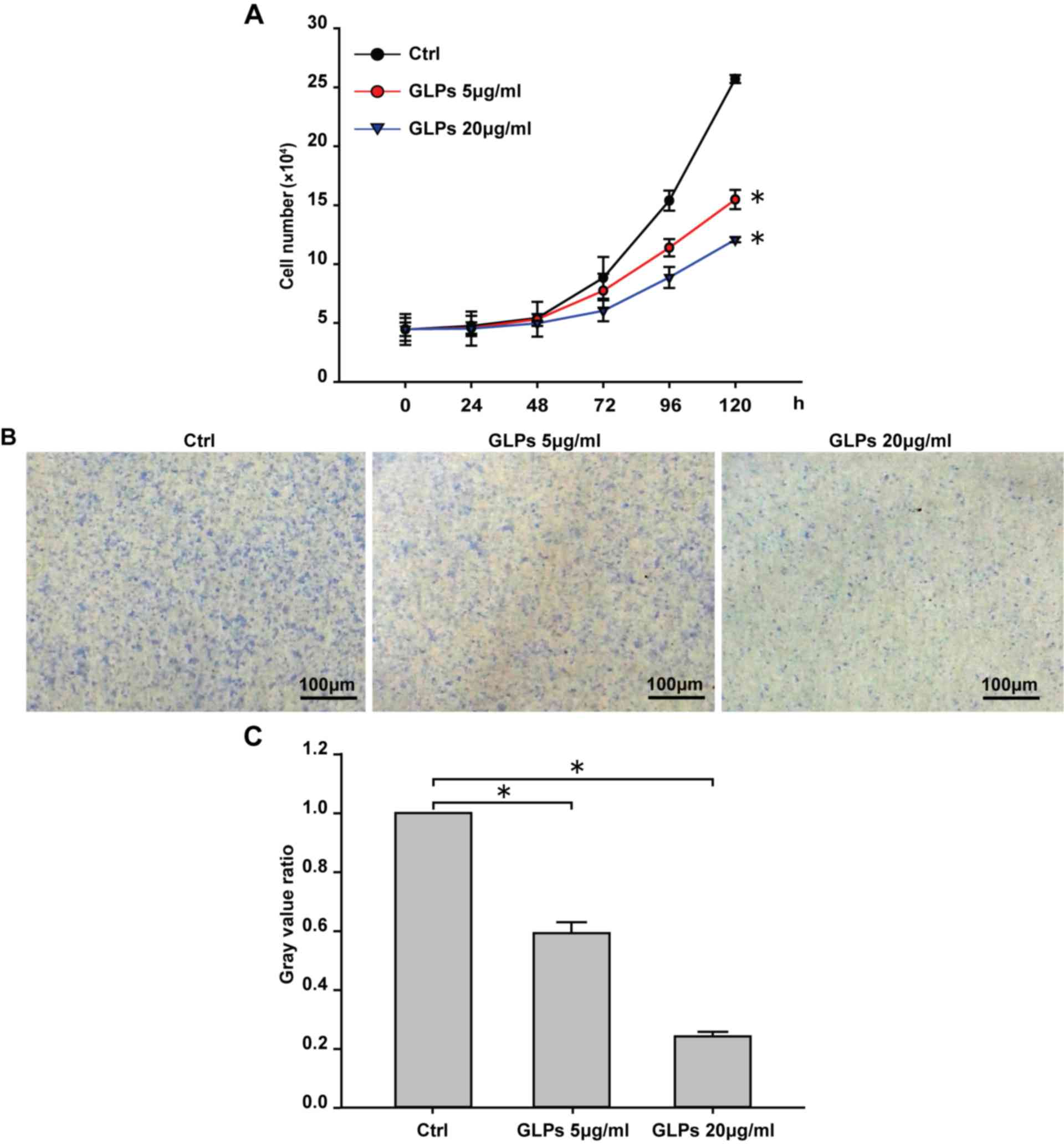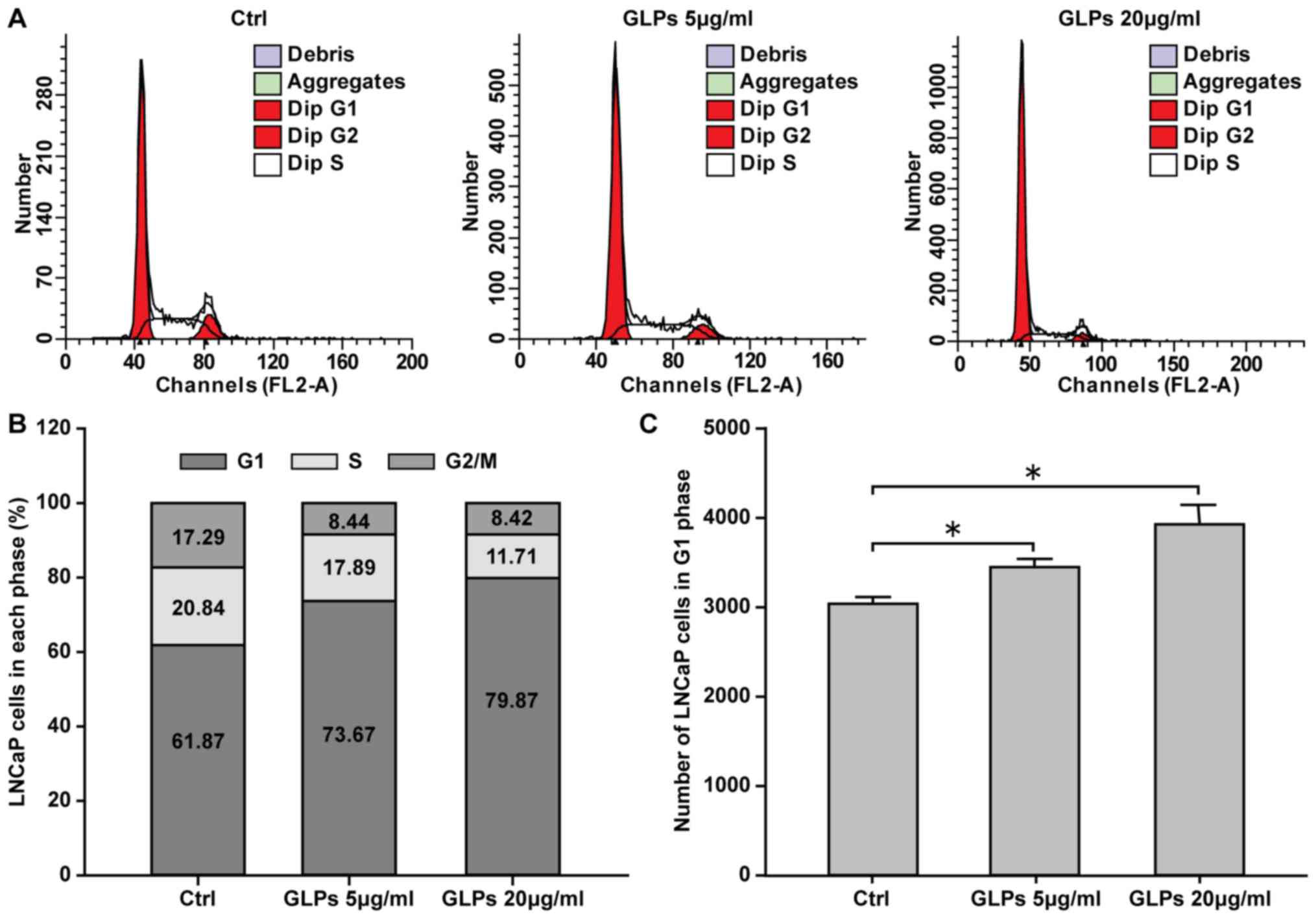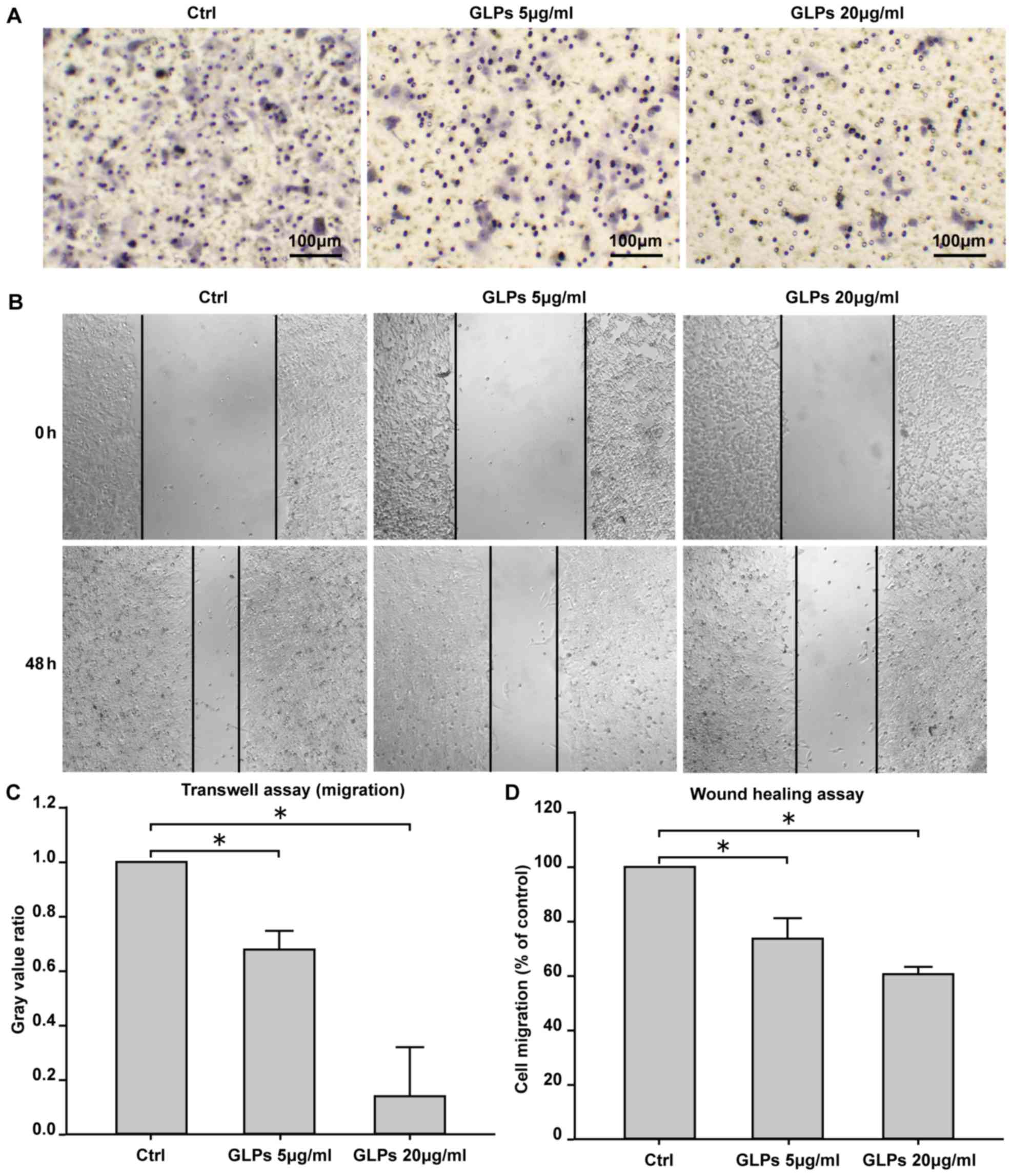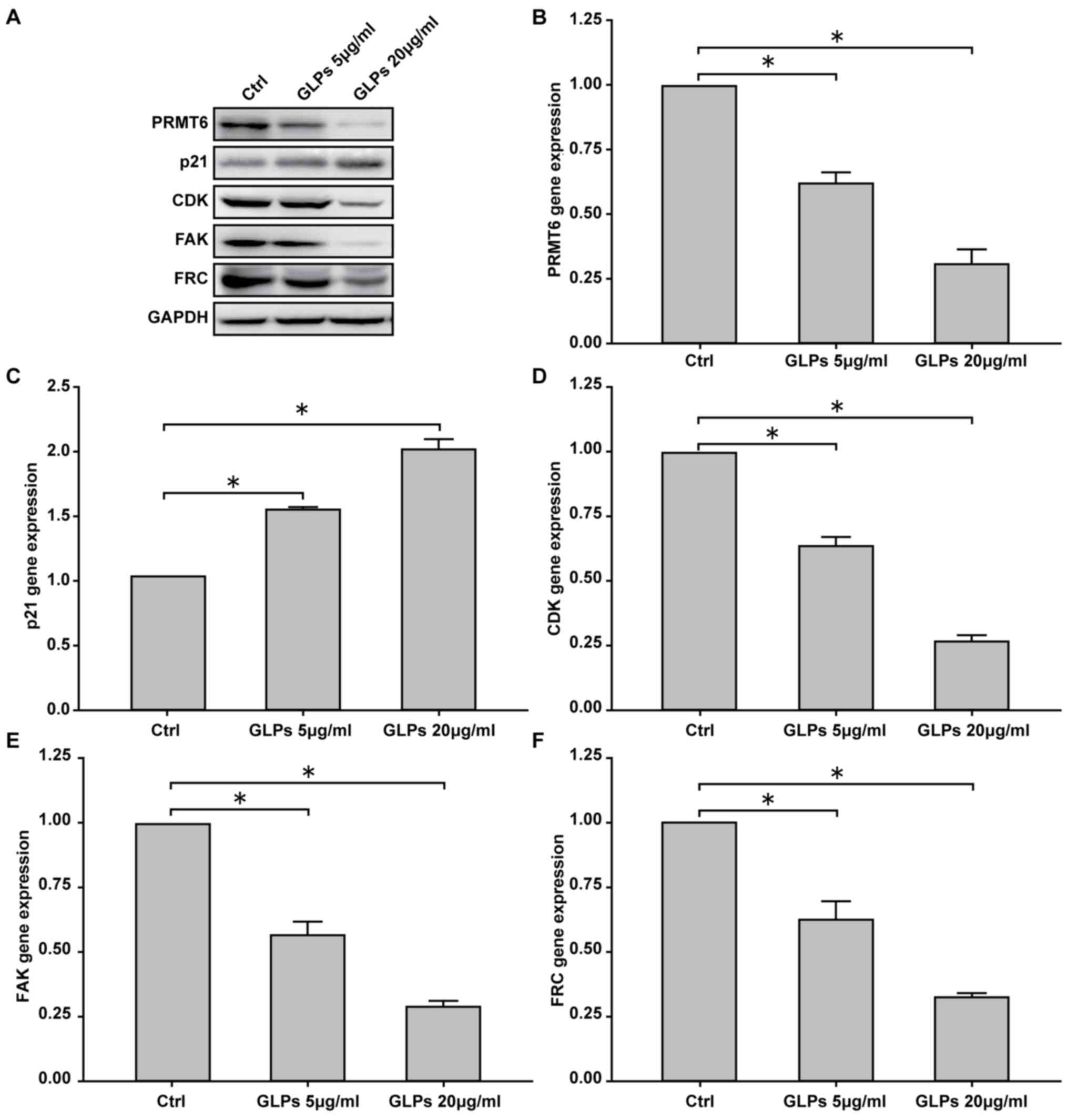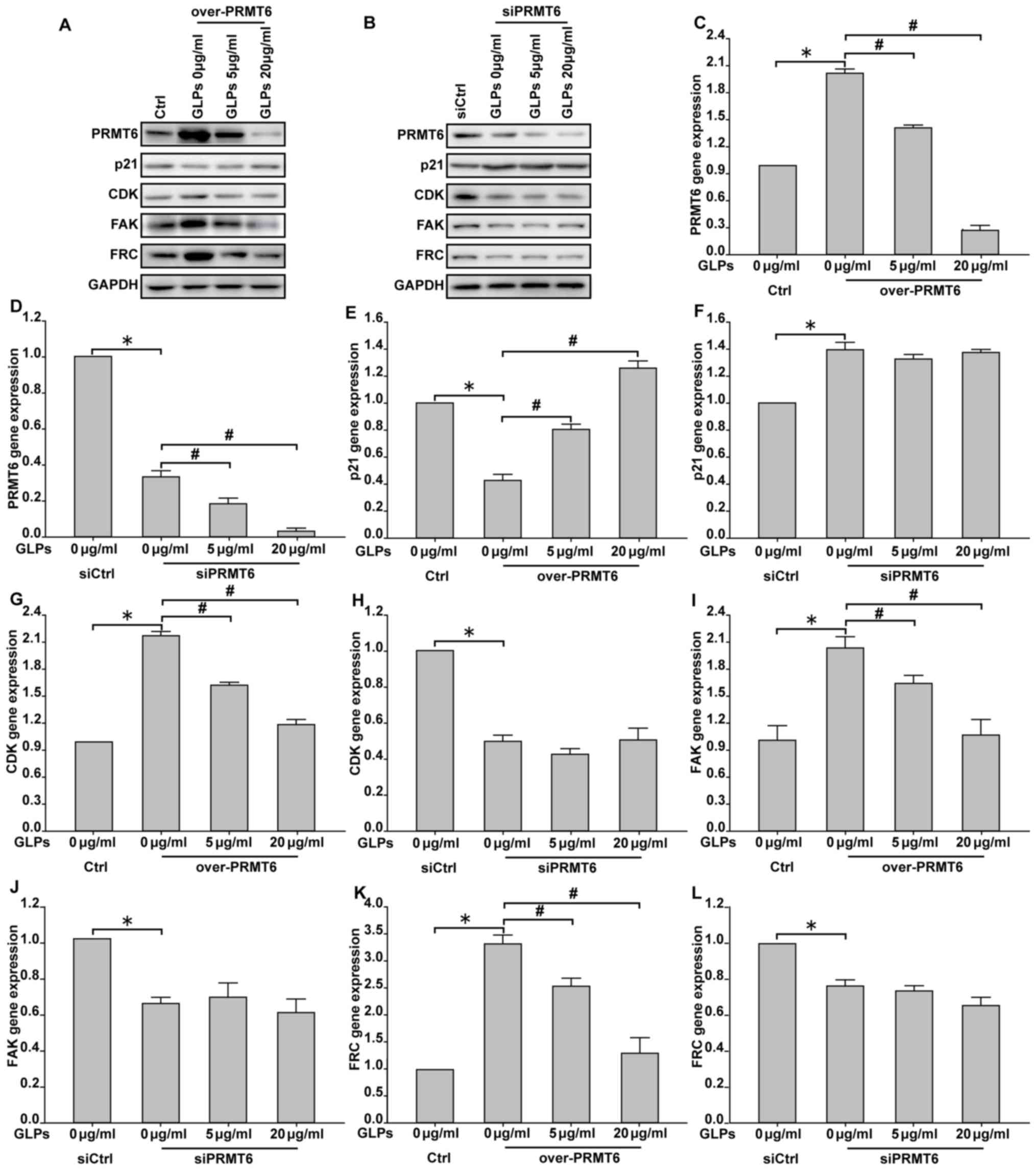|
1
|
Hashim D, Boffetta P, La Vecchia C, Rota
M, Bertuccio P, Malvezzi M and Negri E: The global decrease in
cancer mortality: Trends and disparities. Ann Oncol. 27:926–933.
2016. View Article : Google Scholar : PubMed/NCBI
|
|
2
|
Stegeman S, Amankwah E, Klein K, O'Mara
TA, Kim D, Lin HY, Permuth-Wey J, Sellers TA, Srinivasan S, Eeles
R, et al: A large-scale analysis of genetic variants within
putative miRNA binding sites in prostate cancer. Cancer Discov.
5:368–379. 2015. View Article : Google Scholar : PubMed/NCBI
|
|
3
|
Baade PD, Youlden DR, Cramb SM, Dunn J and
Gardiner RA: Epidemiology of prostate cancer in the Asia-Pacific
region. Prostate Int. 1:47–58. 2013. View Article : Google Scholar : PubMed/NCBI
|
|
4
|
Monn MF, Tatem AJ and Cheng L: Prevalence
and management of prostate cancer among East Asian men: Current
trends and future perspectives. Urol Oncol. 34(58): e1–e9.
2016.
|
|
5
|
Luo M, Li Y, Guo H, Lin S, Chen J, Ma Q,
Gu Y, Jiang Z and Gui Y: Protein Arginine Methyltransferase 6
Involved in Germ Cell Viability during Spermatogenesis and
Down-Regulated by the Androgen Receptor. Int J Mol Sci.
16:29467–29481. 2015. View Article : Google Scholar : PubMed/NCBI
|
|
6
|
El-Andaloussi N, Valovka T, Toueille M,
Steinacher R, Focke F, Gehrig P, Covic M, Hassa PO, Schär P,
Hübscher U and Hottiger MO: Arginine methylation regulates DNA
polymerase beta. Mol Cell. 22:51–62. 2006. View Article : Google Scholar : PubMed/NCBI
|
|
7
|
Ma WL, Wang L, Liu LX and Wang XL: Effect
of phosphorylation and methylation on the function of the p16INK4a
protein in non-small cell lung cancer A549 cells. Oncol Lett.
10:2277–2282. 2015.PubMed/NCBI
|
|
8
|
Meerzaman DM, Yan C, Chen QR, Edmonson MN,
Schaefer CF, Clifford RJ, Dunn BK, Dong L, Finney RP, Cultraro CM,
et al: Genome-wide transcriptional sequencing identifies novel
mutations in metabolic genes in human hepatocellular carcinoma.
Cancer Genomics Proteomics. 11:1–12. 2014.PubMed/NCBI
|
|
9
|
Dowhan DH, Harrison MJ, Eriksson NA,
Bailey P, Pearen MA, Fuller PJ, Funder JW, Simpson ER, Leedman PJ,
Tilley WD, et al: Protein arginine methyltransferase 6-dependent
gene expression and splicing: Association with breast cancer
outcomes. Endocr Relat Cancer. 19:509–526. 2012. View Article : Google Scholar : PubMed/NCBI
|
|
10
|
Vieira FQ, Costa-Pinheiro P,
Ramalho-Carvalho J, Pereira A, Menezes FD, Antunes L, Carneiro I,
Oliveira J, Henrique R and Jerónimo C: Deregulated expression of
selected histone methylases and demethylases in prostate carcinoma.
Endocr Relat Cancer. 21:51–61. 2014. View Article : Google Scholar : PubMed/NCBI
|
|
11
|
Kleinschmidt MA, de Graaf P, van Teeffelen
HA and Timmers HT: Cell cycle regulation by the PRMT6 arginine
methyltransferase through repression of cyclin-dependent kinase
inhibitors. PLoS One. 7:e414462012. View Article : Google Scholar : PubMed/NCBI
|
|
12
|
Yoshimatsu M, Toyokawa G, Hayami S, Unoki
M, Tsunoda T, Field HI, Kelly JD, Neal DE, Maehara Y, Ponder BA, et
al: Dysregulation of PRMT1 and PRMT6, Type I arginine
methyltransferases, is involved in various types of human cancers.
Int J Cancer. 128:562–573. 2011. View Article : Google Scholar : PubMed/NCBI
|
|
13
|
Phalke S, Mzoughi S, Bezzi M, Jennifer N,
Mok WC, Low DH, Thike AA, Kuznetsov VA, Tan PH, Voorhoeve PM and
Guccione E: p53-Independent regulation of p21Waf1/Cip1 expression
and senescence by PRMT6. Nucleic Acids Res. 40:9534–9542. 2012.
View Article : Google Scholar : PubMed/NCBI
|
|
14
|
Kim NH, Kim SN, Seo DW, Han JW and Kim YK:
PRMT6 overexpression upregulates TSP-1 and downregulates MMPs: Its
implication in motility and invasion. Biochem Biophys Res Commun.
432:60–65. 2013. View Article : Google Scholar : PubMed/NCBI
|
|
15
|
Gill BS, Navgeet and Kumar S: Ganoderma
lucidum targeting lung cancer signaling: A review. Tumour Biol.
39:10104283177074372017. View Article : Google Scholar : PubMed/NCBI
|
|
16
|
Batra P, Sharma AK and Khajuria R: Probing
Lingzhi or Reishi medicinal mushroom Ganoderma lucidum
(higher Basidiomycetes): A bitter mushroom with amazing health
benefits. Int J Med Mushrooms. 15:127–143. 2013. View Article : Google Scholar : PubMed/NCBI
|
|
17
|
Liu C, Yang N, Song Y, Wang L, Zi J, Zhang
S, Dunkin D, Busse P, Weir D, Tversky J, et al: Ganoderic acid C1
isolated from the anti-asthma formula, ASHMI™ suppresses TNF-α
production by mouse macrophages and peripheral blood mononuclear
cells from asthma patients. Int Immunopharmacol. 27:224–231. 2015.
View Article : Google Scholar : PubMed/NCBI
|
|
18
|
Chiu HF, Fu HY, Lu YY, Han YC, Shen YC,
Venkatakrishnan K, Golovinskaia O and Wang CK: Triterpenoids and
polysaccharide peptides-enriched Ganoderma lucidum: A
randomized, double-blind placebo-controlled crossover study of its
antioxidation and hepatoprotective efficacy in healthy volunteers.
Pharm Biol. 55:1041–1046. 2017. View Article : Google Scholar : PubMed/NCBI
|
|
19
|
Soccol CR, Bissoqui LY, Rodrigues C, Rubel
R, Sella SR, Leifa F, de Souza Vandenberghe LP and Soccol VT:
Pharmacological properties of biocompounds from spores of the
lingzhi or reishi medicinal mushroom ganoderma lucidum
(Agaricomycetes): A Review. Int J Med Mushrooms. 18:757–767. 2016.
View Article : Google Scholar : PubMed/NCBI
|
|
20
|
Gokce EC, Kahveci R, Atanur OM, Gürer B,
Aksoy N, Gokce A, Sargon MF, Cemil B, Erdogan B and Kahveci O:
Neuroprotective effects of Ganoderma lucidum polysaccharides
against traumatic spinal cord injury in rats. Injury. 46:2146–2155.
2015. View Article : Google Scholar : PubMed/NCBI
|
|
21
|
Liu YJ, Du JL, Cao LP, Jia R, Shen YJ,
Zhao CY, Xu P and Yin GJ: Anti-inflammatory and hepatoprotective
effects of Ganoderma lucidum polysaccharides on carbon
tetrachloride-induced hepatocyte damage in common carp (Cyprinus
carpio L.). Int Immunopharmacol. 25:112–120. 2015. View Article : Google Scholar : PubMed/NCBI
|
|
22
|
Xu Z, Chen X, Zhong Z, Chen L and Wang Y:
Ganoderma lucidum polysaccharides: Immunomodulation and
potential anti-tumor activities. Am J Chin Med. 39:15–27. 2011.
View Article : Google Scholar : PubMed/NCBI
|
|
23
|
Liang ZE, Yi YJ, Guo YT, Wang RC, Hu QL
and Xiong XY: Inhibition of migration and induction of apoptosis in
LoVo human colon cancer cells by polysaccharides from Ganoderma
lucidum. Mol Med Rep. 12:7629–7636. 2015. View Article : Google Scholar : PubMed/NCBI
|
|
24
|
Liang Z, Guo YT, Yi YJ, Wang RC, Hu QL and
Xiong XY: Ganoderma lucidum polysaccharides target a
Fas/caspase dependent pathway to induce apoptosis in human colon
cancer cells. Asian Pac J Cancer Prev. 15:3981–3996. 2014.
View Article : Google Scholar : PubMed/NCBI
|
|
25
|
Li A, Shuai X, Jia Z, Li H, Liang X, Su D
and Guo W: Ganoderma lucidum polysaccharide extract inhibits
hepatocellular carcinoma growth by downregulating regulatory T
cells accumulation and function by inducing microRNA-125b. J Transl
Med. 13:1002015. View Article : Google Scholar : PubMed/NCBI
|
|
26
|
Yang G, Yang L, Zhuang Y, Qian X and Shen
Y: Ganoderma lucidum polysaccharide exerts anti-tumor
activity via MAPK pathways in HL-60 acute leukemia cells. J Recept
Signal Transduct Res. 36:6–13. 2016. View Article : Google Scholar : PubMed/NCBI
|
|
27
|
Chui CH, Wong RS, Cheng GY, Lau FY, Kok
SH, Cheng CH, Cheung F, Tang WK, Teo IT, Chan AS and Tang JC:
Antiproliferative ability of a combination regimen of crocodile egg
extract, wild radix ginseng and natural Ganoderma lucidum on
acute myelogenous leukemia. Oncol Rep. 16:1313–1316.
2006.PubMed/NCBI
|
|
28
|
Zhang Y: Ganoderma lucidum (Reishi)
suppresses proliferation and migration of breast cancer cells via
inhibiting Wnt/β-catenin signaling. Biochem Biophys Res Commun.
488:679–684. 2017. View Article : Google Scholar : PubMed/NCBI
|
|
29
|
Smina TP, Nitha B, Devasagayam TP and
Janardhanan KK: Ganoderma lucidum total triterpenes induce
apoptosis in MCF-7 cells and attenuate DMBA induced mammary and
skin carcinomas in experimental animals. Mutat Res. 813:45–51.
2017. View Article : Google Scholar : PubMed/NCBI
|
|
30
|
Huang JH, Ailati A and Mao J: Purification
and Structural Identification of a Bioactive Polysaccharide
Fraction from Ganoderma lucidum. Food Sci. 32:301–304.
2011.
|
|
31
|
He Y, Ye M, Du Z, Wang H, Wu Y and Yang L:
Purification, characterization and promoting effect on wound
healing of an exopolysaccharide from Lachnum YM405. Carbohydr
Polym. 105:169–176. 2014. View Article : Google Scholar : PubMed/NCBI
|
|
32
|
Shang D, Li Y, Wang C, Wang X, Yu Z and Fu
X: A novel polysaccharide from Se-enriched Ganoderma lucidum
induces apoptosis of human breast cancer cells. Oncol Rep.
25:267–272. 2011.PubMed/NCBI
|
|
33
|
Livak KJ and Schmittgen TD: Analysis of
Relative Gene Expression Data Using RealTime Quantitative PCR and
the 2(-Delta Delta C(T)) method. Methods. 25:402–408. 2001.
View Article : Google Scholar : PubMed/NCBI
|
|
34
|
Kim SY, Seo M, Kim Y, Lee YI, Oh JM, Cho
EA, Kang JS and Juhnn YS: Stimulatory heterotrimeric GTP-binding
protein inhibits hydrogen peroxide-induced apoptosis by repressing
BAK induction in SH-SY5Y human neuroblastoma cells. J Biol Chem.
283:1350–1361. 2008. View Article : Google Scholar : PubMed/NCBI
|
|
35
|
Jing H, Liaw L, Friesel R, Vary C, Hua S
and Yang X: Suppression of Spry4 enhances cancer stem cell
properties of human MDA-MB-231 breast carcinoma cells. Cancer Cell
Int. 16:192016. View Article : Google Scholar : PubMed/NCBI
|
|
36
|
Li YB, Wang R, Wu HL, Li YH, Zhong LJ, Yu
HM and Li XJ: Serum amyloid A mediates the inhibitory effect of
Ganoderma lucidum polysaccharides on tumor cell adhesion to
endothelial cells. Oncol Rep. 20:549–556. 2008.PubMed/NCBI
|
|
37
|
Li W, Nie S, Chen Y, Wang Y, Li C and Xie
M: Enhancement of cyclophosphamide-induced antitumor effect by a
novel polysaccharide from Ganoderma atrum in sarcoma
180-bearing mice. J Agric Food Chem. 59:3707–3716. 2011. View Article : Google Scholar : PubMed/NCBI
|
|
38
|
Kim C, Lim Y, Yoo BC, Won NH, Kim S and
Kim G: Regulation of post-translational protein arginine
methylation during HeLa cell cycle. Biochim Biophys Acta.
1800:977–985. 2010. View Article : Google Scholar : PubMed/NCBI
|
|
39
|
Stein C, Nötzold RR, Riedl S, Bouchard C
and Bauer UM: The arginine methyltransferase PRMT6 cooperates with
polycomb proteins in regulating HOXA Gene Expression. PLoS One.
11:e01488922016. View Article : Google Scholar : PubMed/NCBI
|
|
40
|
Stein C, Riedl S, Ruthnick D, Nötzold RR
and Bauer UM: The arginine methyltransferase PRMT6 regulates cell
proliferation and senescence through transcriptional repression of
tumor suppressor genes. Nucleic Acids Res. 40:9522–9533. 2012.
View Article : Google Scholar : PubMed/NCBI
|
|
41
|
Neault M, Mallette FA, Vogel G,
Michaud-Levesque J and Richard S: Ablation of PRMT6 reveals a role
as a negative transcriptional regulator of the p53 tumor
suppressor. Nucleic Acids Res. 40:9513–9521. 2012. View Article : Google Scholar : PubMed/NCBI
|
|
42
|
Lv H, Gao G, Zhang L and Sun Y: Pololike
kinase 3 inhibits osteosarcoma cell proliferation and tumorigenesis
via cooperative interaction with p21. Mol Med Rep. 12:6789–6796.
2015. View Article : Google Scholar : PubMed/NCBI
|
|
43
|
Wan D, Jiang C, Hua X, Wang T and Chai Y:
Cell cycle arrest and apoptosis induced by aspidin PB through the
p53/p21 and mitochondria-dependent pathways in human osteosarcoma
cells. Anticancer Drugs. 26:931–941. 2015. View Article : Google Scholar : PubMed/NCBI
|
|
44
|
Wang J, Lei ZJ, Guo Y, Wang T, Qin ZY,
Xiao HL, Fan LL, Chen DF, Bian XW, Liu J and Wang B:
miRNA-regulated delivery of lincRNA-p21 suppresses β-catenin
signaling and tumorigenicity of colorectal cancer stem cells.
Oncotarget. 6:37852–37870. 2015. View Article : Google Scholar : PubMed/NCBI
|
|
45
|
Al-Azayzih A, Gao F and Somanath PR: P21
activated kinase-1 mediates transforming growth factor β1-induced
prostate cancer cell epithelial to mesenchymal transition. Biochim
Biophys Acta. 1853:1229–1239. 2015. View Article : Google Scholar : PubMed/NCBI
|
|
46
|
Di Giacomo V, Di Valerio V, Rapino M,
Bosco D, Cacciatore I, Ciulla M, Marrazzo A, Fiorito J, Di Stefano
A and Cataldi A: MRJF4, a novel histone deacetylase inhibitor,
induces p21 mediated autophagy in PC3 prostate cancer cells. Cell
Mol Biol (Noisy-le-grand). 61:17–23. 2015.PubMed/NCBI
|
|
47
|
Isin M, Uysaler E, özgur E, Koseoglu H,
Sanli ö, Yucel öB, Gezer U and Dalay N: Exosomal lncRNA-p21 levels
may help to distinguish prostate cancer from benign disease. Front
Genet. 6:1682015.PubMed/NCBI
|
|
48
|
Kim SH, Hwang KA, Shim SM and Choi KC:
Growth and migration of LNCaP prostate cancer cells are promoted by
triclosan and benzophenone-1 via an androgen receptor signaling
pathway. Environ Toxicol Pharmacol. 39:568–576. 2015. View Article : Google Scholar : PubMed/NCBI
|
|
49
|
Lin HP, Lin CY, Huo C, Hsiao PH, Su LC,
Jiang SS, Chan TM, Chang CH, Chen LT, Kung HJ, et al: Caffeic acid
phenethyl ester induced cell cycle arrest and growth inhibition in
androgen-independent prostate cancer cells via regulation of Skp2,
p53, p21Cip1 and p27Kip1. Oncotarget. 6:6684–6707. 2015. View Article : Google Scholar : PubMed/NCBI
|
|
50
|
Wei K, Ye Z, Li Z, Dang Y, Chen X, Huang
N, Bao C, Gan T, Yang L and Chen G: An immunohistochemical study of
cyclin-dependent kinase 5 (CDK5) expression in non-small cell lung
cancer (NSCLC) and small cell lung cancer (SCLC): A possible
prognostic biomarker. World J Surg Oncol. 14:342016. View Article : Google Scholar : PubMed/NCBI
|
|
51
|
Bisht S, Nolting J, Schutte U, Haarmann J,
Jain P, Shah D, Brossart P, Flaherty P and Feldmann G:
Cyclin-Dependent Kinase 5 (CDK5) controls melanoma cell motility,
invasiveness and metastatic spread-identification of a promising
novel therapeutic target. Transl Oncol. 8:295–307. 2015. View Article : Google Scholar : PubMed/NCBI
|
|
52
|
Chen JS, Li HS, Huang JQ, Dong SH, Huang
ZJ, Yi W, Zhan GF, Feng JT, Sun JC and Huang XH: MicroRNA-379-5p
inhibits tumor invasion and metastasis by targeting FAK/AKT
signaling in hepatocellular carcinoma. Cancer Lett. 375:73–83.
2016. View Article : Google Scholar : PubMed/NCBI
|
|
53
|
Sanchez Castillo R, Gomez R and Salazar
Perez E: Bisphenol A Induces Migration through a GPER-, FAK-, Src-
and ERK2-Dependent Pathway in MDA-MB-231 Breast Cancer Cells. Chem
Res Toxicol. 29:285–295. 2016. View Article : Google Scholar : PubMed/NCBI
|
|
54
|
Li S, Li C, Ryu HH, Lim SH, Jang WY and
Jung S: Bacitracin inhibits the migration of U87-MG glioma cells
via interferences of the integrin outside-in signaling pathway. J
Korean Neurosurg Soc. 59:106–116. 2016. View Article : Google Scholar : PubMed/NCBI
|
|
55
|
Wang X, Huang Y, Zhao J, Zhang Y, Lu J and
Huang B: Suppression of PRMT6-mediated arginine methylation of p16
protein potentiates its ability to arrest A549 cell proliferation.
Int J Biochem Cell Biol. 44:2333–2341. 2012. View Article : Google Scholar : PubMed/NCBI
|
|
56
|
Michaud-Levesque J and Richard S:
Thrombospondin-1 is a transcriptional repression target of PRMT6. J
Biol Chem. 284:21338–21346. 2009. View Article : Google Scholar : PubMed/NCBI
|
|
57
|
Zhang S, Nie S, Huang D, Huang J, Wang Y
and Xie M: Polysaccharide from Ganoderma atrum evokes
antitumor activity via Toll-like receptor 4-mediated NF-κB and
mitogen-activated protein kinase signaling pathways. J Agric Food
Chem. 61:3676–3682. 2013. View Article : Google Scholar : PubMed/NCBI
|
|
58
|
Yu Q, Nie SP, Wang JQ, Yin PF, Li WJ and
Xie MY: Polysaccharide from Ganoderma atrum induces tumor
necrosis factor-α secretion via phosphoinositide 3-kinase/Akt,
mitogen-activated protein kinase and nuclear factor-κB signaling
pathways in RAW264.7 cells. Int Immunopharmacol. 14:362–368. 2012.
View Article : Google Scholar : PubMed/NCBI
|
|
59
|
Wu GS, Song YL, Yin ZQ, Guo JJ, Wang SP,
Zhao WW, Chen XP, Zhang QW, Lu JJ and Wang YT: Ganoderiol
A-enriched extract suppresses migration and adhesion of MDA-MB-231
cells by inhibiting FAK-SRC-paxillin cascade pathway. PLoS One.
8:e766202013. View Article : Google Scholar : PubMed/NCBI
|
|
60
|
Lin SB, Li CH, Lee SS and Kan LS:
Triterpene-enriched extracts from Ganoderma lucidum inhibit
growth of hepatoma cells via suppressing protein kinase C,
activating mitogen-activated protein kinases and G2-phase cell
cycle arrest. Life Sci. 72:2381–2390. 2003. View Article : Google Scholar : PubMed/NCBI
|















